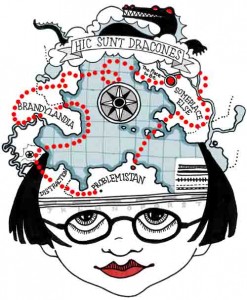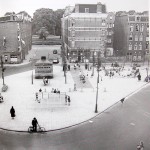Quote voice-over video "Childhood Storage" by Anna-Nicole Ziesche, Boijmans, 'The Art of Fashion' october '09…
Definition of mental map
 What joy! Having found the word ‘mental map’ I Wiki’d it and the term does exist. And it fits my terminology, too – though I give it a wider interpretation than is suggested here, I also include mental maps of objects or bodies. Funny that the english wiki is blank on on mental maps (may want to add that myself) but the dutch wiki has it:
What joy! Having found the word ‘mental map’ I Wiki’d it and the term does exist. And it fits my terminology, too – though I give it a wider interpretation than is suggested here, I also include mental maps of objects or bodies. Funny that the english wiki is blank on on mental maps (may want to add that myself) but the dutch wiki has it:
Het concept van een mentale kaart (Engels: mental map), geeft aan hoe de persoonlijke perceptie van een persoon is van zijn geografische omgeving, de manier waarop hij zijn ruimtelijke omgeving structureert. Het is geen geografische kaart, maar een representatie van het cognitieve beeld dat een individu in zijn gedachten heeft. Hoewel dit onderwerp meer op zijn plaats lijkt bij de sociale wetenschappen , wordt dit onderwerp meestal bestudeerd door geografen om te bepalen hoe het publiek subjectief plaatsen waarneemt. Het proces van mental mapping is afhankelijk van perceptie en cognitie.
De geografische werkelijkheid komt hierbij niet overeen met de mentale kaart. Er is dan ook veel verschil tussen de mentale kaarten van verschillende individuen, omdat iedereen een ander beeld van de werkelijkheid vormt. Op basis van de mentale kaart beweegt het individu zich door zijn omgeving. De positieve of negatieve beelden van de omgeving die door de bewoners zijn verkregen en verwerkt, worden door Lefebvre ‘spaces of representation’ genoemd.
De mentale kaart bevindt zich in principe inwendig, maar deze kan tot uitdrukking komen in mondelinge verslagen, tekeningen en oordelen.
Massamedia hebben ook een effect op de mentale kaart van een persoon. De waargenomen geografische dimensies van een ander land (relatief met het eigen) kan vaak beïnvloed zijn door de hoeveelheid tijd die massamedia aan dat land besteden. Ook reistijd kan van invloed zijn op de mentale cartering van een regio.[1]
And here is my translation:
The concept of the mental map (dutch: mentale kaart) describes a persons personal perception of his geographical surroundings, the way he structures his spatial surroundings in his mind. It is not a geographical map, but a representation fo the cognitive image that an individual has in mind. Althoug this subject seems to be more at its place in the social sciences, it is usually studied by geographers to find how the public subjectively perceives certain places. The process of mental mapping is dependant on perception and cognition.
The geographic reality does not fit with the mental map. There is a considerable difference between the mental maps of different individuals, because everyone makes another image of reality (in their minds). Based on his mental map an individual moves throug his surroundings [space]. Lefebvre calls the positive or negative images of an arrea that those that live there have built up and processed ‘spaces of representation’.
Mental maps are in-the-brain things, but can be represented in words, drawings and the way things are judged.
Mass media have an effect on a person’s mental map. The perceived geographical dimensions of another country (relative to one’s own) can very well be influenced by the amount of time the mass media spend on this country. Travelling time can also be of influence on the mental cartography of a region.
Just knew I’d come back to mapmaking again! By the way: mental mapping is not mind mapping .
07/10: Checked the english wiki again: there is a ‘mental mapping’ section with a few good leads.
| « Find a legend for a girl | <-- previous post | next post --> | Stanley Milgram on testing the unaware » |
|---|







